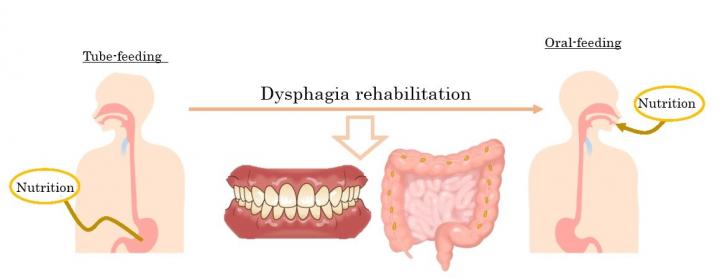
Credit: Department of Gerodontology and Oral Rehabilitation,
Department of Periodontology,TMDU
Tokyo, Japan – The importance of the microorganisms that live on and in our bodies has long been recognized, and their complex synergistic impact on our systemic health is elucidated. Now, researchers from Japan have shown the importance of normal eating for the composition and balance of our individual oral and gut microbiota.
In a study published in Frontiers in Cellular and Infection Microbiology in December 2019, researchers from Tokyo Medical and Dental University (TMDU) have shown the importance of normal feeding for establishing and maintaining appropriate bacteria in the mouth and the gut.
Our bodies are symbiotic units of human cells and microorganisms. Far from being deleterious, this microbiota is now recognized as a vital modulator of functions such as digestion, mood, sleep and response to drugs, as well as susceptibility to diabetes, autism, obesity and cancer.
Patients convalescing from stroke often have dysphagia, and need to be fed via a tube to bypass the mouth. “We hypothesized that resuming oral food intake could modify the composition of oral and gut microbial communities in tube-fed patients,” explains senior author Haruka Tohara, Associate Professor of Gerodontology and Oral Rehabilitation at TMDU. “To test this, we compared oral and gut microbiome profiles before and after the resumption of oral food intake in eight post-stroke patients recovering from enteral nutrition.”
Senior author, Takahiko Shiba, elaborates further: “We evaluated oral and gut microbiota community profiles by sequencing 16s rRNA in saliva and feces samples collected when the patients were being fed via tube and after they switched back to eating normally. We then examined the co-occurrence and interaction patterns of the microbial communities and conducted computational prediction of their function.”
The researchers were surprised to find that re-initiation of oral food intake dramatically altered and diversified both oral and gut microbiomes. Though very different in composition, both showed an increase of the family Carnobacteriaceae and genus Granulicatella suggesting that orally ingested bacteria may directly modulate the gut community thus affecting systemic health. Although oral microbiota alteration was more significant than that in the gut, metagenome prediction showed more differentially enriched pathways in the gut, especially those related to fatty acid metabolism.
“Networks in both microbiomes were simpler and fewer, which may indicate healthier restructuring,” observes lead author Sayaka Katagiri, Assistant Professor of Periodontology at TMDU. “Additionally, altered interaction between core species suggests improved microbiome balance.”
Given the problems associated with tube feeding, this study provides another overwhelming motive for early reversion to normal feeding: that of restoring a beneficial oral and gut microbiome.
###
The article, “Re-initiation of Oral Food Intake Following Enteral Nutrition Alters Oral and Gut Microbiota Communities” was published in Frontiers in Cellular and Infection Microbiology at DOI: 10.3389/fcimb.2019.00434
Media Contact
Haruka TOHARA, Sayaka KATAGIRI
[email protected]
Original Source
http://www.
Related Journal Article
http://dx.




